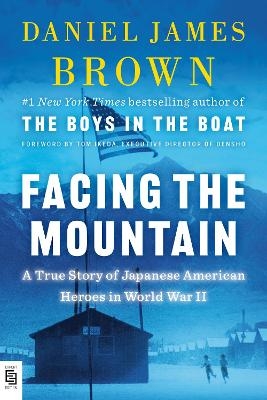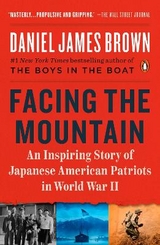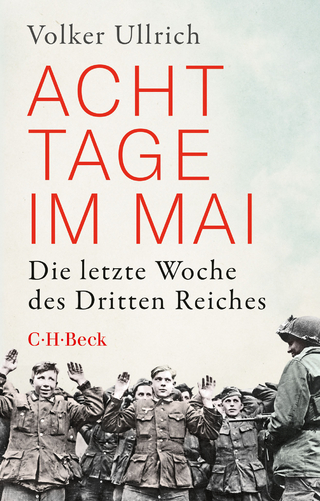
Facing the Mountain
Viking (Verlag)
978-0-593-29981-4 (ISBN)
One of NPR's "Books We Love" of 2021
Longlisted for the PEN/Jacqueline Bograd Weld Award for Biography
Winner of the Christopher Award
“Masterly. An epic story of four Japanese-American families and their sons who volunteered for military service and displayed uncommon heroism… Propulsive and gripping, in part because of Mr. Brown’s ability to make us care deeply about the fates of these individual soldiers...a page-turner.” – Wall Street Journal
From the #1 New York Times bestselling author of The Boys in the Boat, a gripping World War II saga of patriotism and resistance, focusing on four Japanese American men and their families, and the contributions and sacrifices that they made for the sake of the nation.
In the days and months after Pearl Harbor, the lives of Japanese Americans across the continent and Hawaii were changed forever. In this unforgettable chronicle of war-time America and the battlefields of Europe, Daniel James Brown portrays the journey of Rudy Tokiwa, Fred Shiosaki, and Kats Miho, who volunteered for the 442nd Regimental Combat Team and were deployed to France, Germany, and Italy, where they were asked to do the near impossible. Brown also tells the story of these soldiers' parents, immigrants who were forced to submit to life in concentration camps on U.S. soil. Woven throughout is the chronicle of Gordon Hirabayashi, one of a cadre of patriotic resisters who stood up against their government in defense of their own rights. Whether fighting on battlefields or in courtrooms, these were Americans under unprecedented strain, doing what Americans do best—striving, resisting, pushing back, rising up, standing on principle, laying down their lives, and enduring.
Daniel James Brown is the author of The Indifferent Stars Above and Under a Flaming Sky, which was a finalist for the B&N Discover Great New Writers Award, as well as The Boys in the Boat, a New York Times bestselling book that was awarded the ALA’s Andrew Carnegie Medal for Excellence in Nonfiction. He has taught writing at San José State University and Stanford University. He lives outside Seattle.
Just before dawn on the morning of October 18, Fred Shiosaki crawled out of a dank pup tent, strapped a mortar tube on his back, grabbed his rifle, and began to walk toward the battle. With the other two battalions still fighting for control of the hills around town, Colonel Pence had ordered the Third Battalion to make a frontal attack on the German forces in Bruyères, liberate the town, and then advance toward the village of Belmont to the northeast. George Montana Oiye hoisted a carbine and fell in alongside Fred. He d been temporarily assigned to K Company to serve as their forward observer in the event that they needed artillery support from the 522nd while making their assault.
As K Company spread out, moving through dense stands of pine, the sounds of the battle ahead of them were oddly muffled. A thick gray fog made it hard to see more than a dozen yards in any direction. Fred s breath issued forth in small white clouds. His footfall was nearly inaudible, softened by thick piles of wet moss on the forest floor. The moss worried Fred. He had been warned that the Germans had hidden hundreds of Bouncing Betty mines in the stuff, and he feared those almost as much as he feared the deadly 88-millimeter shells that he knew might come shrieking at them out of the fog at any minute.
But when K Company finally emerged from the woods and entered the
flatter, more open terrain immediately in front of the town, everything around them seemed to explode. The roar of the battle engulfed them. Fred stumbled forward over muddy furrows in an open field. Bullets whipped by on both sides of him. Incoming shells whistled over his head. Columns of black earth and fractured yellow stone erupted in front of him and behind him. Wounded horses in a nearby barn screamed. Searing-hot shards of shrapnel flew in all directions, making weird fluttering sounds. The smell of explosives and diesel and mud and blood
filled the air.
Fred and the men near him dropped and began to crawl forward on their bellies as streams of machine gun fire poured from the windows of nearby farmhouses and machine-gun nests hidden behind stone garden walls. But returning the fire, lobbing mortars at the buildings, firing bazookas, and throwing hand grenades, K Company kept moving forward, assaulting each machine-gun nest in turn, concentrating their fire on it until it was silenced, then moving on to the next.
On the outskirts of town, they came across a wide bend in a road. Sergeant George Iwamoto, squad leader and one of Fred s closest friends a kotonk through and through, a kindred spirit from the east- ern side of Washington State raised his hand to pause his men and get their attention. He didn t like the looks of the place. He wanted them out of there as quickly as possible. He stood up, started waving his hands, bellowing, Come on, you guys, come on! urging them to cross the road quickly. Fred hunched over and ran for it. He made it across. They all did except one. Just as Iwamoto began to follow the last of his men across, a shell landed right behind him, hurling him forward a dozen feet, shattering his spine, paralyzing him from the waist down. Seeing his friend there, sprawled out on the road in the rain, bloodied, desperately trying to crawl forward, dragging his legs, helpless, Fred felt suddenly and overwhelmingly sick to his stomach. For a moment, he closed his eyes and slumped against a stone wall. Like everyone else, he wanted to turn and run from this place, from the horror. Like everyone else, he didn t. A medic dragged Iwamoto off the road. The rest of them got up
and moved on.
At the entrance to the town itself, they faced a barricade a road- block built of enormous logs, timbers, and boulders that the Germans had chained together and intertw
| Erscheinungsdatum | 13.05.2021 |
|---|---|
| Zusatzinfo | 52 PHOTOS THROUGHOUT; 5 MAPS |
| Sprache | englisch |
| Maße | 153 x 228 mm |
| Gewicht | 686 g |
| Themenwelt | Literatur ► Biografien / Erfahrungsberichte |
| Sachbuch/Ratgeber ► Geschichte / Politik | |
| Geschichte ► Allgemeine Geschichte ► 1918 bis 1945 | |
| Geschichte ► Teilgebiete der Geschichte ► Militärgeschichte | |
| Sozialwissenschaften ► Ethnologie | |
| Sozialwissenschaften ► Soziologie | |
| Schlagworte | Asian American • Asian American History • Biographies • Biography • Boys in the Boat • dad gifts • Eleanor Roosevelt • fathers day gifts • gifts for dad • gifts for history buffs • Historical books • History • History books • history buff gifts • history gifts • history teacher gifts • Japanese American • Japanese American history • Japanese history • Japanese internment • large print books • Mass Incarceration • military history • military history books • Mountain • Nazi • Pacific War • Pearl Harbor • the boys in the boat • U.S. History • war • World War 2 • world war 2 books • World War II • ww2 • ww2 books • WW II |
| ISBN-10 | 0-593-29981-7 / 0593299817 |
| ISBN-13 | 978-0-593-29981-4 / 9780593299814 |
| Zustand | Neuware |
| Haben Sie eine Frage zum Produkt? |
aus dem Bereich



